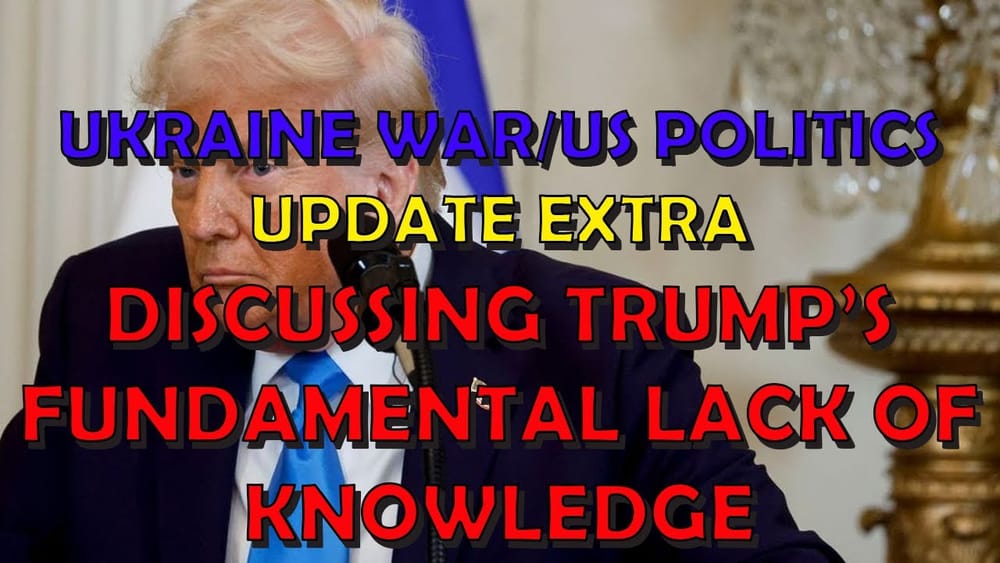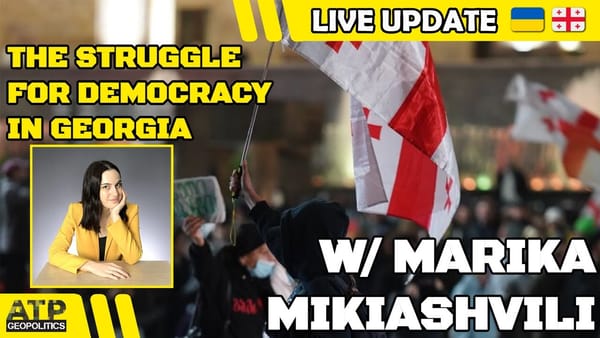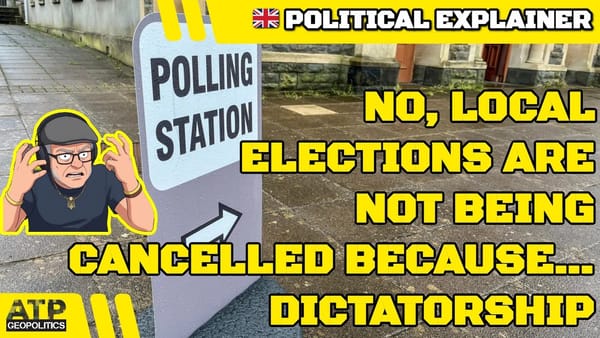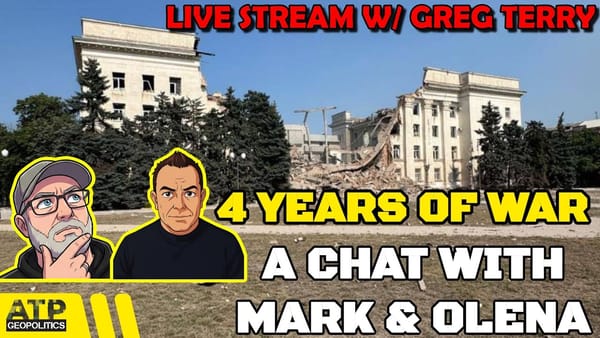Discussing Trump's Fundamental Lack of Knowledge: Ukraine War/US Politics Update EXTRA
Table of Contents 📖
"If you don't have the knowledge, you're not going to make knowledgeable decisions. And so it's more likely that your decisions are going to be irrational or bad."
Hello Team
🎦 00:00-00:09⏩
- Jonathan welcomes viewers to ATP Geopolitics.
- This video is a "Ukraine war and US politics extra" focusing on knowledge and the lack of it in leaders, particularly concerning geopolitics, domestic politics, economics, and policy.
- He argues that leaders need a broad and deep knowledge base to make informed decisions, using the "garbage in, garbage out" principle.
Putin's Misinformed Invasion of Ukraine
🎦 00:09-01:14⏩
- Jonathan reflects on Putin's decision to invade Ukraine, calling it terrible and based on "terrible information, terrible intelligence".
- He anticipates historians will investigate how such poor intelligence led to the invasion.
- He emphasizes the importance of knowledge for leaders, especially for a US president, to understand politics and governance.
Donald Trump's Ignorance and Lack of Knowledge
🎦 01:14-02:39⏩
- Jonathan asserts that Donald Trump is "fundamentally ignorant" regarding the Ukraine war and geopolitics in general.
- He clarifies this is not a personal attack but a factual observation about Trump's lack of knowledge, distinguishing it from personal dislike.
- Jonathan aims to be factual and not rhetorical in his analysis.
Trump's False Claims about Kyiv and Ukrainian Cities
🎦 02:39-03:43⏩
- Jonathan highlights Trump's recent statements demonstrating his ignorance about Ukraine.
- Trump claimed Kyiv had not been hit and that 20% of it was destroyed, which Jonathan refutes as "demonstrably false" based on his own visits to Kyiv.
- Trump also falsely stated that "virtually all the cities are in ruined rubbles" with destroyed "thousand year old golden domes".
Reality of Destruction in Ukraine
🎦 03:43-04:20⏩
- Jonathan clarifies that while some cities in eastern Ukraine like Mariupol, Bakhmut and Popasna have suffered heavy destruction, this is not representative of the entire country.
- He points out that areas behind the front lines and western Ukraine are "broadly fine" and "untouched", respectively.
- He estimates the active war zone to be approximately 20% of the country, a "corridor of destruction", contrasting it with Trump's exaggerated claims about Kyiv and all Ukrainian cities.
NATO Responsibility and Trump's Lack of Understanding
🎦 04:20-05:34⏩
- Jonathan addresses Trump's claim that NATO started the war, dismissing it as an "incorrect claim based on false interpretation".
- He acknowledges that some experts like John Mearsheimer and Jeffrey Sachs blame NATO, but argues this stems from their pre-existing ideologies rather than a lack of knowledge.
- Jonathan states that a true understanding of Ukrainian and Russian history reveals NATO is not at fault.
- He suggests Trump's lack of a knowledge base prevents him from verifying or refuting information, making him susceptible to misinformation.
Trump's Reading Habits and Information Sources
🎦 05:34-06:27⏩
- Jonathan mentions the "common knowledge" that Trump "doesn't read", raising questions about his sources of information.
- He suggests Trump relies on what people tell him, recalling a story from Anthony Scaramucci about explaining things to Trump on a plane and being surprised by his lack of basic knowledge.
- This dependence on others for information makes Trump vulnerable to manipulation and unable to verify claims.
Danger of Trump's Advisors and Ideology
🎦 06:27-07:03⏩
- Jonathan expresses concern about Trump being a "victim to other people's ideology" due to his lack of knowledge.
- He identifies people around Trump, such as Elbridge Colby and Stephen Miller, as "truly dangerous people" associated with "Project 2025 worldview".
- He argues that Trump's ignorance makes him easily manipulated by these advisors.
Trump's Denial of Involvement in Tate Brothers' Release
🎦 07:03-08:27⏩
- Jonathan shifts to another example of Trump's potential ignorance or dishonesty: the release of the Tate brothers from Romanian custody.
- He presents a news clip questioning Trump about whether his administration pressured Romania to release the Tate brothers, who are accused of rape and human trafficking.
- Trump responds, "I know nothing about that," and "We'll check it out, we'll let you know," despite reports suggesting US administration involvement.
Options: Ignorance or Lying about Tate Brothers
🎦 08:27-09:15⏩
- Jonathan analyses Trump's response regarding the Tate brothers, presenting two possibilities: either Trump is genuinely ignorant or he is lying.
- If ignorant, it's "staggering" that the US administration could act controversially without his knowledge, particularly regarding figures aligned with the "alt manosphere" and connected to Trump Jr.
Options: Lying about Tate Brothers
🎦 09:15-09:43⏩
- Alternatively, if Trump is lying about not knowing, it is also "problematic" as he is directly denying knowledge when questioned.
- Jonathan concludes that "neither option is good" - ignorance or lying - presenting a binary choice with no acceptable middle ground.
Trump's Ignorance of AUKUS
🎦 09:43-11:27⏩
- Jonathan moves to another example of "staggering lack of knowledge": Trump's apparent ignorance of AUKUS (Australia, UK, US security pact).
- He presents news headlines highlighting Trump's "AUKUS blunder" and questioning "what does it mean?".
- Jonathan finds it "incredible" and "embarrassing" that a US presidential candidate, especially one focused on national security and China, would be unaware of AUKUS.
AUKUS Importance and Trump's Reaction
🎦 11:27-12:35⏩
- Jonathan explains AUKUS as a "trilateral security partnership" aimed at countering Chinese influence in the Indo-Pacific, involving submarine procurement and manufacturing.
- He emphasizes AUKUS's importance, particularly for a "hawk on China" like Trump.
- He notes Trump's attempt to "paper over the crack" of his ignorance by vaguely mentioning Australia and a "great relationship," but concludes Trump "clearly has no idea what AUKUS is".
Disturbing Implications of Trump's AUKUS Ignorance
🎦 12:35-13:10⏩
- Jonathan expresses being "deeply, deeply disturbing" by Trump's lack of AUKUS knowledge, considering it a "problem if you're a national leader".
- While acknowledging AUKUS may have largely started after Trump left office, he argues the groundwork would have been laid during his presidency, and he "should absolutely know about it now".
Lack of Briefings and Reliance on Pictures
🎦 13:10-13:38⏩
- Jonathan speculates that Trump's ignorance suggests he "doesn't get briefed a lot," or delegates excessively without retaining key information.
- He recalls reports from Trump's first administration that he "stopped taking briefings" and preferred briefings with pictures, implying a disinterest in in-depth information.
- This reinforces the theme of Trump's aversion to knowledge and reliance on superficial information.
Trump's Denial about Calling Zelensky a Dictator
🎦 13:38-14:24⏩
- Jonathan presents another example: Trump's denial of calling Zelensky a dictator.
- He plays a clip where Trump is asked "Do you still think that Mr. Zelensky is a dictator?" and Trump responds with apparent surprise and denial: "Did I say that? I can't believe I said that."
- Jonathan questions whether this is genuine ignorance, forgetfulness, or "disingenuous" shirking of responsibility.
Possible Explanations for Trump's Zelensky Dictator Denial
🎦 14:24-15:28⏩
- Jonathan explores explanations for Trump's denial.
- One possibility is genuine forgetfulness, especially if the "dictator" claim originated in a Truth Social post potentially written by aides.
- He notes that Trump's social media presence likely involves aides, suggesting he might not be fully aware of everything posted under his name.
Trump's Potential Lack of Awareness of His Own Rhetoric
🎦 15:28-16:20⏩
- Jonathan suggests that Trump might not have "cogitated on the finer details" or nuances of social media posts attributed to him, leading to a lack of awareness of his own rhetoric.
- He highlights the potential situation where Trump is unaware he called Zelensky a dictator, demonstrating a lack of being "ahead of" his own public pronouncements.
- This again points to a "lack of knowledge of his own supposed rhetoric".
Trump Dodges Apology for Dictator Comment
🎦 16:20-17:08⏩
- Jonathan plays another clip where Trump is asked to apologise to Zelensky for calling him a dictator while praising Putin.
- Trump deflects the question, stating "We're going to have a very good meeting tomorrow morning. We're going to get along really well," avoiding a direct answer or apology.
- Jonathan interprets this as Trump changing the subject and answering a question that wasn't asked, further highlighting his evasiveness and lack of directness.
Interpreting Trump's Evasiveness on Zelensky Comment
🎦 17:08-17:33⏩
- Jonathan again interprets Trump's evasive response to the Zelensky dictator comment question.
- He presents two interpretations: either Trump knows he said it but is uncomfortable answering, or he genuinely doesn't know and is therefore also uncomfortable.
- Both interpretations again point to problematic scenarios of either dishonesty or ignorance.
Ignorance vs. Lying - Which is Worse?
🎦 17:33-17:56⏩
- Jonathan reflects on the broader question of whether Trump's behaviour stems from ignorance or lying.
- He explicitly asks, "is this a lack of knowledge, though, or is this knowing the truth but lying?"
- He concludes that "neither of these are good" - both ignorance and lying are negative qualities in a leader.
Trump's Misunderstanding of Tariffs
🎦 17:56-19:28⏩
- Jonathan shifts to a third example: Trump's misunderstanding of tariffs.
- He plays a clip where Trump claims "tariffs are paid eventually by foreign countries" and that they are "paid for by the country" not American consumers.
- Jonathan immediately corrects this, stating "No, they're not".
- Trump further claims tariffs are necessary because the US has been "treated very unfairly" in trade.
Trump's False Claim of Tariff Revenue and No Inflation
🎦 19:28-20:08⏩
- Trump continues to assert that "I put massive tariffs on China...we took in hundreds of billions of dollars and we had no inflation," attributing the "best economy" to tariffs.
- He dismisses the widely accepted economic understanding of tariffs as a "myth" propagated by foreign countries.
- Jonathan again refutes this as "just not true," highlighting the disconnect from economic reality.
Trump Dismisses Evidence and Lacks Explanation on Tariffs
🎦 20:08-20:48⏩
- Jonathan points out that Trump dismisses evidence against his tariff claims simply by stating "It's a myth. It's just not true," without providing any explanation.
- When pressed on "How did you arrive at that conclusion?", Trump repeats "It's a myth," avoiding any reasoned justification.
- Jonathan reiterates the central question: "is this ignorance or is this lying?" regarding Trump's tariff understanding.
Expert Explanation of Tariffs and Refutation of Trump's Claims
🎦 20:48-21:48⏩
- Jonathan introduces Ben Stile, director of international economics, to provide an expert explanation of tariffs and refute Trump's claims.
- Stile explains that Trump's claims about tariffs bringing revenue from abroad and repatriating production are "impossible across the board."
- He clarifies "foreigners do not pay the tariffs. Tariffs are import taxes paid by the importer," directly contradicting Trump.
- Stile emphasizes that tariffs are taxes on importers, not foreign countries, and that you "can't tax a foreign country".
How Tariffs Impact Consumers and Importers
🎦 21:48-23:28⏩
- Stile elaborates on how tariffs work: importers pay the tax and then decide whether to absorb the cost or pass it onto consumers, with the latter being more typical.
- He addresses a more nuanced argument that exporters might lower prices to offset tariffs, but clarifies this only applies if the US importer has "monopsonist" buying power.
- He clarifies that even in this case, the "exporters pay" argument is an abstract concept and doesn't mean foreign governments are directly funding US coffers.
Incompatibility of Tariff Revenue and Protecting US Manufacturing
🎦 23:28-25:05⏩
- Stile highlights the fundamental incompatibility of Trump's claims that tariffs both generate revenue and protect US manufacturing.
- He explains that tariff revenue comes from continued imports. If tariffs successfully protect US manufacturing, imports decrease, and tariff revenue diminishes.
- "It can't do both those things that Donald Trump claims."
Tariffs as a Tax on Domestic Entities, Not Foreign Countries
🎦 25:05-26:03⏩
- Stile reiterates that tariffs are not "extracting money from abroad" but are a tax on "your own consumers or your own manufacturers."
- He explains that even if tariffs encourage domestic manufacturing, the revenue does not originate from foreign countries but from within the US economy.
- Jonathan concludes that "Trump appears not to know this or is lying" about tariffs.
Oliver Alexander's Observation on Trump's Fans and Beliefs
🎦 26:03-26:40⏩
- Jonathan introduces a comment from Oliver Alexander regarding Trump and his supporters.
- Alexander observes that Trump fans are constantly forced to "do constant 180s on fundamental political beliefs" to align with Trump's ever-changing positions.
- This highlights the inconsistency and lack of a stable ideological core in Trump's pronouncements.
Lack of Knowledge as the Root of Trump's Inconsistency
🎦 26:40-27:58⏩
- Jonathan agrees with Alexander's observation and links Trump's inconsistency to his "fundamental level of knowledge."
- He contrasts Trump's lack of grounding in knowledge with his own deep knowledge base on the Ukraine war, which provides stability and consistency to his views.
- He argues that without a solid knowledge foundation, Trump's opinions are easily swayed and lack coherence.
Coherence Theory of Truth and Trump's Knowledge "Nuggets"
🎦 27:58-28:46⏩
- Jonathan introduces the "coherence theory of truth" from philosophy, explaining that new information is evaluated based on how well it coheres with existing knowledge.
- He argues that Trump's lack of broad knowledge means new information "falls onto like an empty floor" without connections to a larger understanding.
- This lack of coherence allows contradictory ideas to be easily accepted and swapped out, explaining Trump's flip-flopping.
Trump's Flip-Flopping on Ukraine Land and Crimea
🎦 28:46-30:11⏩
- Jonathan provides a specific example of Trump's flip-flopping: his changing stance on Ukraine's territorial concessions.
- He notes Trump previously suggested Ukraine would have to "give away their land" and appeared to accept the loss of 1991 borders.
- He contrasts this with Trump's recent statement about helping Ukraine "get a lot of it back," including potentially Crimea, which is a "complete 180".
- This inconsistency is attributed to Trump's lack of a stable knowledge base on the issue.
Ramifications of Trump's Lack of Knowledge: Unreliability
🎦 30:11-31:05⏩
- Jonathan summarizes the ramifications of Trump's "lack of substantial knowledge base."
- He argues that it leads to being "easily swayed," "inconsistent," and "unreliable."
- He emphasizes the importance of fundamental knowledge for a leader to be taken seriously and to be a reliable ally.
Contrast with a Serious Politician and "Garbage In, Garbage Out"
🎦 31:05-31:48⏩
- Jonathan contrasts Trump with a "serious politician" possessing "serious amount of knowledge," as opposed to a "businessman propped up by an NBC apprentice program."
- He reiterates the "garbage in, garbage out" principle, stating that without knowledge, decisions are likely to be "irrational or bad."
- He emphasizes "knowledge is power," but suggests Trump's power is "not deep-rooted" due to his lack of knowledge.
Trump's Power: Populism, Not Knowledge
🎦 31:48-33:04⏩
- Jonathan elaborates on the nature of Trump's power, describing it as "populist power" rather than power derived from knowledge and understanding.
- He argues Trump's power comes from saying "what people want to hear" and manipulating the system to maintain power, rather than from intellectual depth or strategic thinking.
- He concludes "There isn't some great mind at work here."
Trump's Political Intelligence and Delusion of Knowledge
🎦 33:04-34:28⏩
- Jonathan acknowledges Trump's "political intelligence," but clarifies it is focused on "political PR and populism" - knowing what to say to gain support.
- He notes Trump is "very good at that," explaining his electoral success.
- He points to a "great sense of delusion" in Trump, who "appears to genuinely think he is pretty knowledgeable" and "thinks he knows what he's talking about."
Trump's Boastful Claims of Superior Knowledge Across Domains
🎦 34:28-35:58⏩
- Jonathan presents a montage of clips where Trump makes boastful claims about his superior knowledge in numerous fields.
- These claims include: taxes, construction, campaign finance, drones, technology, infrastructure, H-1B, H-2B, ISIS, environmental impact statements, Facebook, renewables, polls, courts, steelworkers, golf, banks, trade, nuclear weapons, lawsuits, offense/defense, money, debt, contributions, and politicians.
- The sheer volume and absurdity of these claims underscore Trump's inflated self-perception and delusion of knowledge.
Irony of Trump's "Modesty" and Wrap Up
🎦 35:58-36:07⏩
🎦 35:58-36:07⏩
- Jonathan concludes the video with a final ironic clip of Trump claiming, "The truth is I'm actually a modest person. Very modest. It's true."
- He ends with a simple "Discuss," leaving the audience to reflect on the extensive evidence presented regarding Trump's lack of knowledge and inflated self-image.




